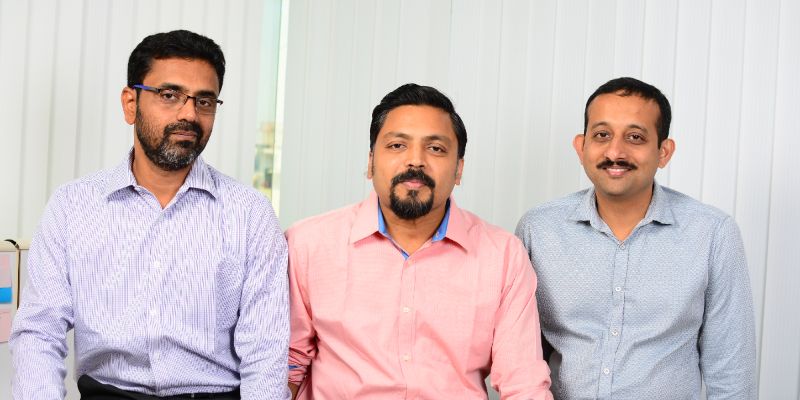As COVID-19 pandemic continues to spread, India is now the country with the third highest number of cases. Amid the healthcare crisis and falling economy, it is also important for business enterprises to resume operations in order to keep their businesses running.
As companies, factories, restaurants, among others, open up, it is necessary to take appropriate measures, maintain social distancing, and implement contactless technologies to keep the infectious disease at bay.
Many innovators and product engineering companies have been developing solutions to make the workplace safer for employees who are returning to work.
One such company is Ignitarium Technology Solutions. The Bengaluru-based product engineering startup offers a visual AI-based digital adherence platform, FLK-i™ to ensure PPE compliance at the workplace.
Apart from this, the startup also developed Septra, based on audio technologies, which enables contactless operation of equipment and appliances.
Founded in 2012 by Sanjay Jayakumar, Ramesh Shanmugham, Sujith Mathew, and Sujeeth Joseph, Ignitarium focuses on providing product engineering solutions and services such as semiconductor design, embedded software, multimedia, and artificial intelligence.
Passion for technology brought the co-founders together and the team together brought a mix of expertise in semiconductor, embedded software, and product engineering.
Speaking to YourStory, Co-founder and CEO Sanjay Jayakumar says, “Ignitarium had developed and deployed a vision-based PPE gear-checking solution for one of our healthcare customers in 2018. Now, this solution is seen as critical to operations across factories, construction sites, and so on.”
Amid the COVID-19 pandemic, the startup is deploying FLK-i™ across businesses to ensure PPE compliance.

[LtoR] Sanjay Jayakumar (CEO), Ramesh Shanmugham (COO) and Sujith Mathew (CTO), co-founders of Ignitarium Technology Solutions
AI-based solution
According to Sanjay, a major portion of the startup’s product engineering work includes AI-based vision and audio solutions for businesses across sectors to improve critical parameters such as quality, productivity, safety, and automation.
“In the post-COVID-19 world, we can expect widespread deployment of technologies that take away human interaction with machines/situations and automates processes. Our deep learning-based video and audio intelligence solutions fit well into these scenarios,” he says.
Ignitarium’s product line includes TYQ-i™, FLK-i™, and Septra.
According to the company, TYQ-i™ is a visual deep learning-based defect detection platform, which is used by businesses to perform automatic inspection.
“The product can be deployed for inspection of Industry 4.0 targeted use cases such as infrastructure asset analytics or real-time assembly line QA,” the CEO says.
FLK-i™ is a digital adherence platform which is used for safety-centric applications such as attire or PPE compliance, virtual-geo fencing, human behaviour analytics, and parking lot monitoring.
The startup also developed a product named Septra which allows users to control devices and appliances through voice commands and can be used by businesses involved in the industrial, white goods, and consumer devices segments.
Businesses and more
According to a report by Accenture, artificial intelligence has the potential to add $957 billion, or 15 percent of India’s current gross value by 2035.
The CEO claims that Ignitarium has grown roughly at a CAGR of 60 percent over the past seven years. He revealed that the bootstrapped startup is in the process of making a few strategic investments in order to sustain these growth rates over the next three-year period.
While Sanjay refuses to disclose details about their clientele, he claims that both TYQ-i™ and FLK-i™ have been deployed across India, US, Europe, and Japan.
Speaking about Septra, he claims that the company completed its first pilot roll-out with a Japanese giant and also has multiple deployments in the pipeline across India, Taiwan, and Germany.
The co-founder explains that the pandemic affected the operational mode of the company but did not impact the revenue aspect. He adds that while Ignitarium recorded a slow demand initially, the situation has improved and the company could meet its Q1 targets. He believes that the annual targets will be met as well.
“In general, we are flexible with our engineering engagement models and that defines the type of revenue and pricing models. Our product engineering services are a mix of multi-year relationships with Tier-1 and Tier-2 system and semiconductor companies, ownership-based co-development with Tier-3s, and carefully curated startups. Our pricing models include fixed-price contracts and annuity deals. As for our product lines, our revenue models range from NRE contracts, platform or per-part licensing with AMCs, and most often a combination of all these,” Sanjay explains.
Speaking about future plans, the CEO says the startup will focus on scaling up and enhancing its edge-to-cloud scalable-AI architecture to address audio, video and signal-driven deep learning solutions for large-scale industrial deployments.
“Our engineering design services business continues to see healthy traction and growth and in the next two years we will strive to be the best available alternative for our customers in each of the areas that we represent,” Sanjay says.
Edited by Javed Gaihlot
Want to make your startup journey smooth? YS Education brings a comprehensive Funding Course, where you also get a chance to pitch your business plan to top investors. Click here to know more.
Link : https://yourstory.com/2020/09/bengaluru-product-engineering-startup-workplace-safety-covid-19
Author :- Shreya Ganguly ( )
September 07, 2020 at 05:15AM
YourStory

